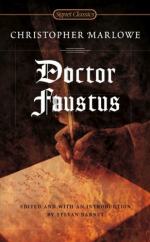|
|
Dr. Faustus Topic Tracking: Hubris
Prologue
Hubris 1: Even in the prologue, the chorus refers to Faustus' pride as his major character trait, even making an allusion to the ancient Greek tragedy of Daedalus and Icarus, where Icarus, while flying with waxen wings, defies his father's warning and gets too close to the sun, plunging to his death.
Scene 1
Hubris 2: Valdes and Cornelius act as feeders of Faustus' ego by proclaiming that he has a great mind for magic, that once he gets a feel for it, he will surpass their expertise and become renowned and powerful for his skills. They profess no limitations, but only boundless opportunities. Faustus happily and greedily accepts such praise. They have made him so excited that he wishes to start that very night.
Scene 2
Hubris 3: Faustus' chief characteristic can be further assessed through the character of the people he influences, namely, his servant Wagner. As if begotten of Faustus, Wagner acts and speaks with an air of sophistication to the two scholars. Wagner's attitude echoes that of Faustus'. Furthermore, the fact that one of the scholars thinks that Faustus cannot be dissuaded suggests that he is known to be stubborn and difficult to control.
Scene 3
Hubris 4: Faustus believes that his powers and skills in magic allowed him to command even a devil. Faustus' confidence in himself is growing.
Hubris 5: Mephistophilis reveals that Lucifer was once a dearly beloved angel of God, but was cast down to hell because of his "aspiring pride and insolence." Having experienced the agonies of hell, Mephistophilis tries to dissuade Faustus, but he does not listen. In fact, Faustus rebukes Mephistophilis for not being as defiant as he. Faustus has reached a level of arrogant defiance against God that surpasses even a devil.
Scene 4
Hubris 6: There is a development in Wagner's character that sheds light on what he is learning from his master. As Faustus makes a bargain with the devil, Wagner now goes off looking for his own servant. He makes the clown follow him by a display of magic that he somehow learns from Faustus. In his encounter with the two scholars, Wagner was arrogant in speech. Here, his arrogance has grown. He is arrogant in action.
Scene 6
Hubris 7: Faustus is close to repenting, but almost commits the ultimate act of hubris-believing that he is beyond the point of repentance. The Good Angel says that it is never too late to call on the name of Christ. Faustus relents by calling on Christ, but Lucifer steps in to prevent full repentance. Faustus vows to burn the Scriptures, a conspicuous act of rejecting God.
Scene 7
Hubris 8: Faustus uses his powers to travel around the world. But he requests to invade the Pope's privy-chamber to play a practical joke on the spiritual leader of the Roman Catholic Church. Faustus has complete disregard for the religious establishment.
Scene 9
Hubris 9: Robin and Ralph use the stolen magic book to conjure Mephistophilis. This scene serves as comic relief, but it also parodies Faustus' use of magic. It is understandable that Robin and Ralph would use magic for such lowly activities, but Faustus' use of it is not much nobler, although he thinks he is great because of the power and notoriety he receives.
Scene 10
Hubris 10: Faustus' confrontation with the Knight shows the pettiness of his arrogance. Faustus puts horns on the head of the Knight because the Knight had doubted his powers. Faustus makes a point that knowledge (being a scholar) is more powerful than the sword (a knight).
Scene 13
Hubris 11: Rather than heed the words of the Old Man, Faustus chooses the ultimate act of hubris-killing oneself instead of repenting. The Old Man convinces him not to go through with it.
Scene 14
Hubris 12: The Chorus ends the story by restating what it proclaimed at the beginning-that Faustus' fall was the result of overstepping the God-given boundaries of man.




